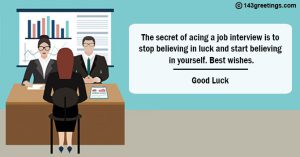Karen Idesoh, one of our Careers Consultants, has written a post about how to ace your interviews. It can be scary and stressful when going for interviews but the better you prepare, the calmer you will feel!
For curiosity I googled “Interview Success Tips” and got 324 000 000 hits. Some sites promised a magical 4 tips, others a lucky number 7, one even went as high as a mighty 21 top tips.
Don’t worry, click bait top tips are not what you will get from your careers team! Instead, I will tell you what works for new students and graduates tackling the “Interview Stage” based on real life experience of supporting students from all career disciplines in over 20 years work in Higher Education.
First, the good news. If you are at the interview stage, the recruiter views you as a serious candidate. Now is the time to get serious about your preparation and research.
Second, there is no magic shortcut to preparation. You need to invest time in reflecting on what you offer and researching the employer in more depth.
As a career consultant I regularly talk about avoiding “rookie mistakes,” the sort of mistakes that you can avoid by using career service resources and working with a career consultant.
So, what does effective preparation look like?
Reading the recruitment information comprehensively. Employers, especially large graduate recruiters want you to be well prepared, so they usually provide candidates detailed information about the selection process. If they are using an online platform, you can check if there is a candidate or career section that may provide additional information.
Now while you might not know exactly what questions you may be asked there are common themes that come up in most interviews such as:
- Tell me about yourself?
- Why do you want to work for us?
- What are your strengths and weaknesses/what are your areas for development?
- What is your biggest achievement?
- Tell me about a time when …?
- How would you deal with a situation in which …?
The wording may vary slightly between recruiters but often the question is covering the same ground. Your job is to listen carefully, interpret what they are asking and why? See here for more detail on typical questions. Different recruiters may choose from a range of question styles such as motivational, competency and strength based. Use our resources to familiarise and prepare for these different question styles.
Alongside researching typical interview questions, reread the job description/role and your initial application so that you stay relevant to the job when you have to expand on your key attributes and skills at interview. Be yourself and authentic in your responses and examples. Experienced recruiters have a strong sense of when they are “being gamed,” it seldom works.
Make sure you practice giving answers to questions and listen back. You can use our resource to practice and review yourself or you can book a practice interview with a career consultant. Both give you a valuable development opportunity to:
- make a rookie mistake and learn for next time
- deal with an unexpected question
- become aware of nervous habits or how you come across to others
- work on the flow and specificity of your answer
- get honest and constructive feedback
Always remember that it’s not about being perfect. It’s about doing yourself justice by being able to talk about your experiences and skills/attributes so that an employer has an authentic sense of you as an individual! In that way they can more fully judge the potential you bring to their organisation. Being authentic and prepared so that you come across as professional is my number one feedback advice in practice interviews!
Finally, do take time to research the employer in more depth. It is in your interest to understand the sector context/current business developments, organisational culture, and values. See Twitter/Glass Door and other social media including google news. You want to be sure that you understand what working for this organisation involves! Interviews are a two-way process – recruiters want the right people for their organisation, and you want great opportunities to develop a successful and satisfying career. With preparation you can use the interview process to achieve this goal.
Always remember:

